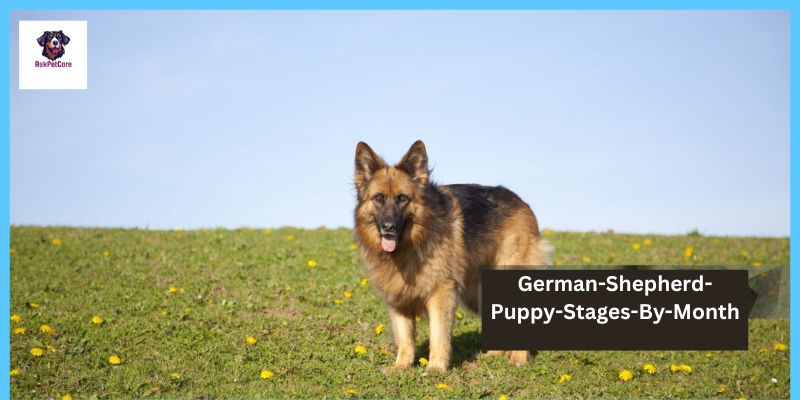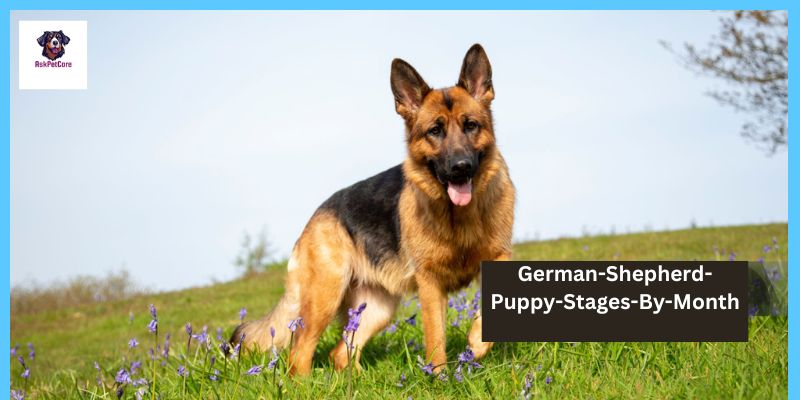hello dog lovers I am Dr Arif Aziz in this blog post I will tell you briefly about the German shepherd puppy stages by month. Watching German shepherd puppies grow and develop is a delightful experience. Understanding the different stages of their development can help you take better care of your puppy and support them as they grow into their best selves.

I’ve been taking care of pets especially dogs at my clinic for a long time, exactly 14 years! I’m here to share some valuable information with you that I’ve gathered from books during my study time written by experts in veterinary medicine (DVM) and MSC (Master of Science), as well as from my own experiences working with dogs. I’ve been running my Veterinary Clinic for the past 14 years.
German shepherd puppies go through several stages of development as they grow from birth to adulthood. These stages are characterized by physical, mental, and behavioral changes.
Here’s an overview of the German Shepherd puppy stages by month, providing insights into their physical, behavioral, and developmental milestone
A Brief overview of the German shepherd puppy stages by month.
In this comprehensive guide, we’ll walk you through each month of a German Shepherd puppy’s life, from birth to adulthood. We’ll explore the physical, emotional, and behavioral changes they undergo, as well as provide practical tips for navigating each stage. Whether you’re a first-time puppy parent or a seasoned dog owner, this guide will equip you with the knowledge and tools to ensure the well-being and happiness of your German Shepherd at every step of the way.

-
Birth to 4 Weeks: The Neonatal Stage
Characteristics of Newborn German Shepherd Puppies: Newborn German Shepherd puppies are incredibly tiny, weighing just a few ounces at birth. They’re born with their eyes closed and are unable to hear, relying solely on their sense of touch and smell to navigate their surroundings. Their bodies are delicate, and they spend most of their time sleeping and nursing their mother for nourishment.
Role of the Mother: The mother plays a vital role in caring for her puppies during this stage. She provides warmth, protection, and nourishment through her milk. She also helps stimulate their bodily functions, such as urination and defecation, by licking them. The mother’s presence and care are essential for the puppies’ survival and early development.
Tips for Ensuring Health and Well-being:
- Provide a Warm and Safe Environment: Keep the whelping area warm, between 85-90°F, using heating pads or heat lamps. Ensure the area is free from drafts and potential hazards.
- Monitor Nursing: Ensure that all puppies are nursing regularly and getting enough milk. If you notice any puppies struggling to nurse or appearing weak, consult a veterinarian immediately.
- Maintain Cleanliness: Keep the whelping area clean and dry to prevent infections. Change bedding regularly and clean up any messes promptly.
- Regular Check-ups: Schedule regular check-ups with a veterinarian to monitor the health and development of the puppies. Vaccinations and deworming may also be necessary during this stage.
- Handle with Care: Handle the puppies gently and avoid excessive handling, especially in the first few days. Let the mother bond with her puppies and only intervene when necessary for health checks or feeding.
By following these tips and providing attentive care, you can help ensure the health and well-being of newborn German Shepherd puppies during their neonatal stage.

-
4 to 8 Weeks: The Transitional Stage
Developmental Milestones: During the 4 to 8-week period, German Shepherd puppies undergo significant developmental changes. One of the most notable milestones is the opening of their eyes and ears. Around 2 to 3 weeks of age, puppies begin to open their eyes, allowing them to see the world for the first time. Similarly, their ear canals start to open, enabling them to hear sounds around them. These sensory developments mark an exciting phase of exploration and discovery for the puppies.
Introduction of Solid Food and Weaning Process: As German Shepherd puppies grow, they gradually transition from solely relying on their mother’s milk to consuming solid food. Around 3 to 4 weeks of age, puppies can start nibbling on soft, moistened puppy food. This introduction to solid food helps them develop their chewing skills and prepares them for weaning. Over the next few weeks, the amount of solid food can be increased gradually as the puppies become more accustomed to eating. By 6 to 8 weeks of age, they should be fully weaned from their mother’s milk and solely eating solid puppy food.
Advice on Socialization and Early Training Techniques: Socialization plays a crucial role in shaping a German Shepherd puppy’s behavior and temperament. During this period, it’s essential to expose the puppies to various sights, sounds, smells, and experiences in a positive and controlled manner. This exposure helps them become well-adjusted and confident adults. Introduce them to different people, including children and strangers, as well as other animals, to prevent fearfulness or aggression later in life.
Early training techniques should focus on establishing basic obedience commands and good behavior habits. Start with simple commands like “sit,” “stay,” and “come” using positive reinforcement techniques such as treats and praise. Keep training sessions short and fun to maintain the puppy’s interest and attention. Consistency and patience are key to successful training during this stage.
By focusing on developmental milestones, introducing solid food and weaning gradually, and prioritizing socialization and early training, you can help your German Shepherd puppy thrive during the transitional stage and set a solid foundation for their future growth and development.

-
2 to 4 Months: The Rapid Growth Phase
Significant Growth: During the 2 to 4-month phase, German Shepherd puppies experience rapid physical growth. They undergo noticeable changes in size, weight, and appearance as their bodies develop and mature. Their bones, muscles, and organs grow rapidly during this period, and they may gain several pounds each week. This growth spurt is crucial for laying the foundation for their adult size and strength.
Importance of Nutrition and Exercise: Nutrition plays a vital role in supporting the healthy growth and development of German Shepherd puppies during this phase. A balanced diet rich in essential nutrients, such as protein, vitamins, and minerals, is essential for providing the energy and building blocks their bodies need to grow. Choose a high-quality puppy food formulated specifically for large breeds like German Shepherds and follow the feeding guidelines provided by your veterinarian or the food manufacturer.
Regular exercise is also important for supporting healthy development during this stage. German Shepherd puppies are naturally active and energetic, so providing opportunities for physical activity helps them burn off excess energy, build muscle strength, and develop coordination and agility. Short, supervised play sessions, walks, and interactive games are all great ways to keep your puppy active and engaged.
Guidance on Housebreaking and Basic Obedience Training: Housebreaking, or potty training, is an essential aspect of raising a German Shepherd puppy. Establishing a consistent routine for bathroom breaks, rewarding desired behavior, and supervising your puppy closely indoors can help prevent accidents and encourage them to go potty in designated areas outdoors. Patience, consistency, and positive reinforcement are key to successful housebreaking.
Basic obedience training is also important during this phase to teach your puppy essential commands and manners. Start with simple commands like “sit,” “stay,” and “come,” using positive reinforcement techniques such as treats and praise. Keep training sessions short, fun, and consistent to maintain your puppy’s interest and progress. Early obedience training lays the groundwork for good behavior and strengthens the bond between you and your puppy.
By focusing on providing proper nutrition, regular exercise, housebreaking, and basic obedience training, you can help your German Shepherd puppy thrive during the rapid growth phase and set them up for a healthy and happy adulthood.
-
4 to 9 Months: Continued Growth and Exploration
Continued Growth at a Slower Rate: During the 4 to 9-month period, German Shepherd puppies continued to grow, but at a slower rate compared to the earlier months. While they may not be gaining weight as rapidly as before, they are still filling out and developing muscle mass. Their bones are also still growing and strengthening, although not as quickly as during the rapid growth phase. This period is often referred to as adolescence, where puppies are in the process of transitioning from puppyhood to adulthood.
Behavioral Changes and Challenges: Adolescence brings about behavioral changes and challenges for German Shepherd puppies. They may become more independent, testing boundaries and asserting themselves. This can result in behaviors such as stubbornness, defiance, or selective hearing when it comes to commands. Additionally, some puppies may exhibit signs of fearfulness, insecurity, or aggression as they navigate through this developmental stage.
Tips for Managing Teething, Chewing, and Other Typical Puppy Behaviors:
- Provide appropriate chew toys: German Shepherd puppies, like all puppies, go through teething, which can be uncomfortable and lead to excessive chewing. Provide a variety of durable chew toys to help alleviate discomfort and redirect chewing behavior away from household items.
- Supervise and redirect: Keep a close eye on your puppy and intervene when you catch them chewing on inappropriate objects. Redirect their attention to a chew toy and praise them for chewing on the correct item.
- Consistent training: Continue with basic obedience training to reinforce good behavior and maintain consistency in your expectations. Use positive reinforcement techniques such as treats and praise to encourage desired behaviors.
- Exercise and mental stimulation: Ensure your puppy gets plenty of physical exercise and mental stimulation to prevent boredom and destructive behaviors. Interactive games, puzzle toys, and training sessions can help keep them engaged and fulfilled.
- Socialization: Continue socializing your puppy with a variety of people, animals, and environments to build confidence and reduce the likelihood of fear-based behaviors.
By understanding and addressing the challenges and behaviors that commonly arise during adolescence, you can help your German Shepherd puppy navigate this stage successfully and emerge as a well-behaved and well-adjusted adult dog.

-
9 to 12 Months: Final Growth Phase
Nearing Adulthood and Physical Maturity: During the 9 to 12-month phase, German Shepherd puppies are nearing adulthood and reaching their final stages of physical maturity. While they may continue to fill out and develop muscle mass over the next few months, they have essentially reached their full height and are close to their adult size. This period marks an exciting transition as your puppy begins to resemble the magnificent adult dog they will become.
Importance of Consistent Training and Socialization: As your German Shepherd puppy approaches adulthood, consistent training and socialization become increasingly important. Training should focus on reinforcing basic obedience commands and shaping desired behaviors. Consistency is key, so continue to use positive reinforcement techniques such as treats and praise to encourage good behavior and discourage unwanted behaviors. Socialization should also be ongoing, exposing your puppy to a variety of people, animals, and environments to build confidence and prevent fear-based behaviors as they mature.
Suggestions for Maintaining an Active Lifestyle and Mental Stimulation: To keep your German Shepherd puppy happy, healthy, and engaged during this final growth phase, it’s important to maintain an active lifestyle and provide plenty of mental stimulation. Incorporate daily exercise into your routine, including walks, runs, hikes, and interactive play sessions. German Shepherds are active and energetic dogs that thrive on physical activity, so providing outlets for their energy is essential for their well-being.
In addition to physical exercise, mental stimulation is equally important for keeping your puppy’s mind sharp and preventing boredom. Offer a variety of toys, puzzles, and interactive games to challenge their problem-solving skills and keep them mentally stimulated. Consider enrolling your puppy in obedience classes, agility training, or other canine sports to provide both mental and physical challenges.
By prioritizing consistent training, socialization, an active lifestyle, and mental stimulation during the final growth phase, you can help your German Shepherd puppy transition smoothly into adulthood and set the stage for a fulfilling and rewarding life together.
-
12 to 18 Months: Transition to Adulthood
Completion of Growth and Development: By the time German Shepherd puppies reach 12 to 18 months of age, they have typically completed their growth and development and are considered adults. While they may continue to fill out and develop muscle mass during this period, their height has reached its maximum and they have matured both physically and mentally. This transition marks an important milestone in your puppy’s life as they embark on their journey into adulthood.
Transitioning to Adult Dog Food and Adjusting Care Routines: As your German Shepherd puppy transitions to adulthood, it’s important to adjust their diet accordingly. Transition them from puppy food to adult dog food formulated specifically for large breeds like German Shepherds. Adult dog food contains the appropriate balance of nutrients to support their needs as they reach maturity. Gradually mix the new adult food with their puppy food over about a week to help prevent digestive upset.
In addition to transitioning their diet, you may need to adjust their care routines to accommodate their adult size and energy levels. This may include modifying their exercise regimen, grooming routine, and healthcare needs. Regular veterinary check-ups are still important to ensure your dog remains healthy and to address any concerns that may arise as they transitions to adulthood.
Importance of Continued Training and Reinforcement of Good Behaviors: While your German Shepherd puppy has completed their initial training and socialization, continued training and reinforcement of good behaviors are essential throughout adulthood. Consistency is key, so continue to practice obedience commands and reinforce desired behaviors using positive reinforcement techniques such as treats, praise, and affection.
Additionally, ongoing training can help address any behavior issues that may arise as your dog matures. Whether it’s leash pulling, jumping, or other unwanted behaviors, consistent training and positive reinforcement can help modify these behaviors and ensure your dog remains well-behaved and obedient.
By emphasizing the importance of continued training, transitioning to adult dog food, and adjusting care routines as your German Shepherd puppy transitions to adulthood, you can help ensure they lead a happy, healthy, and fulfilling life as a well-adjusted adult dog.

German Shepherd growth chart:
German Shepherds typically follow a growth pattern that can be generalized as follows:
- Birth to 4 weeks: During this time, German Shepherd puppies are entirely dependent on their mother for nutrition and care. They are born with their eyes closed and are very vulnerable.
- 4 to 8 weeks: Puppies start to open their eyes, and ears, and begin to explore their surroundings. They become more mobile and start to interact with their littermates. They also start transitioning to solid food during this time.
- 2 to 4 months (8 weeks to 16 weeks): This is a crucial growth period for German Shepherd puppies. They grow rapidly and gain weight steadily. This is also the period where they are most receptive to socialization and training. Proper nutrition and care during this time are essential for healthy growth.
- 4 to 9 months (16 weeks to 36 weeks): German Shepherds continue to grow rapidly during this stage, although the growth rate starts to slow down compared to the earlier months. They still require a nutrient-rich diet to support their growth and development.
- 9 to 12 months (36 weeks to 48 weeks): By this time, German Shepherd puppies are approaching their adult size, although they may continue to fill out and develop muscle mass over the next several months. It’s important to continue providing them with a balanced diet and regular exercise to support their growth and overall health.
- 12 to 18 months: Most German Shepherds reach their full height by around 12 months, but they may continue to gain muscle mass and fill out until they are around 18 months old. At this point, they are considered fully grown adults.
Remember that these are general guidelines, and individual puppies may vary in their growth rates. It’s essential to monitor your puppy’s growth and consult with your veterinarian if you have any concerns about their development.
here’s a simple table outlining the growth stages of German Shepherds along with short descriptions:
| Age Range | Growth Stage | Description |
| Birth to 4 weeks | Neonatal Stage | Puppies are entirely dependent on their mother, eyes closed, and vulnerable. |
| 4 to 8 weeks | Transitional Stage | Puppies start opening their eyes/ears, becoming mobile, and transitioning to solid food. |
| 2 to 4 months | Rapid Growth Phase | Puppies grow quickly, receptive to socialization and training. |
| 4 to 9 months | Continued Growth | The growth rate slows but is still substantial, proper nutrition and care are essential. |
| 9 to 12 months | Final Growth Phase | Approaching adult size may continue filling out and developing muscle mass. |
| 12 to 18 months | Maturity | Reach full height by around 12 months, filling out continues until around 18 months. |
This table gives a clear overview of the stages of growth in German Shepherds from birth to maturity.
when do German shepherds stop growing in height?
German Shepherds typically stop growing in height between 12 to 18 months of age. Let me break it down for you:
When a German Shepherd puppy is born, they’re tiny and need their mom for everything. For the first few weeks, they’re like little blind, deaf, and helpless babies. But they grow super fast!
By around 8 weeks, they start opening their eyes and ears, wobbling around, and checking out the world. This is when they start eating solid food too.
From 2 to 4 months old, they hit a growth spurt. They get bigger every day and are like sponges, soaking up all the training and love you give them.
Between 4 to 9 months, they’re still growing, but not as fast as before. They’re like teenagers, still figuring things out and getting used to their new size.
Around 9 to 12 months, they’re almost there! They’re almost as tall as they’re going to be, but they might still be filling out and getting stronger.
By the time they’re 12 to 18 months old, they’ve reached their full height. They’re officially grown-ups! They might still get a bit thicker and more muscular, but they won’t get any taller after this.
So, if you’ve got a German Shepherd puppy, enjoy watching them grow into the big, beautiful dog they’re meant to be!

How long is the German Shepherd puppy stage?
The German Shepherd puppy stage lasts for about the first 18 months of their life. Here’s a simple breakdown:
When a German Shepherd puppy is born, they’re tiny, blind, and need their mom for everything. This is the newborn stage, and it lasts for about 4 weeks. During this time, they’re just learning to wiggle around and open their eyes.
From 4 to 8 weeks old, they enter the puppy stage. This is when they start exploring the world, playing with their littermates, and learning from their mom. They also start eating solid food during this time.
Between 2 to 4 months old, they hit a growth spurt. They’re like little sponges, soaking up everything around them. This is a crucial time for training and socialization, as they’re eager to learn and adapt.
From 4 to 9 months, they’re still considered puppies, but they’re not growing as rapidly as before. They’re like teenagers, testing boundaries and figuring out their place in the world.
Around 9 to 12 months, they’re almost there! They’re almost fully grown but might still be filling out and developing muscle mass.
By the time they’re 12 to 18 months old, they’ve reached adulthood. They’re fully grown and ready to take on the world as mature German Shepherds.
So, the puppy stage is an exciting time full of growth, learning, and discovery for German Shepherds. Enjoy every moment with your furry friends as they grow into the amazing dogs they’re meant to be!
At what age does a German Shepherd stop being a puppy?
A German Shepherd typically stops being a puppy between the ages of 12 to 18 months. Let’s break it down in simple terms:
When a German Shepherd is born, they’re super tiny and need their mom for everything. That’s the newborn stage, and it lasts for about a month. During this time, they’re just learning to open their eyes and wobble around.
From about 4 weeks to 8 weeks old, they enter the puppy stage. This is when they start exploring, playing with their littermates, and learning from their mom. It’s like their childhood, full of fun and discovery.
Between 2 to 4 months old, they hit a growth spurt. They’re like little sponges, soaking up everything around them. This is a crucial time for training and socialization because they’re eager to learn and adapt.
As they reach around 9 to 12 months, they’re still considered puppies, but they’re getting closer to adulthood. They might still have some growing to do, but they’re becoming more like grown-up dogs.
By the time they’re 12 to 18 months old, they’ve pretty much reached their full size and are officially adults. They’ve stopped being puppies and are ready to take on the world as mature German Shepherds.
So, while the exact age can vary from dog to dog, most German Shepherds stop being puppies around 12 to 18 months old. It’s a bittersweet moment, watching them grow up, but it’s also exciting to see them become the amazing dogs they’re meant to be!
stages of development for German shepherd puppies by month.
| Stage | Description |
| Birth to 2 Weeks | – Eyes and ears are closed. – Rely on touch and smell to find their mother and nurse. – Rapid growth and weight gain. |
| 2 to 4 Weeks | – Eyes and ears open. – Begin to explore their surroundings. – Start teething and develop a sense of hearing. |
| 4 to 8 Weeks | – Rapid physical growth. – Start interacting with littermates and humans. – Develop social skills and learn bite inhibition. |
| 8 to 12 Weeks | – Teething intensifies. – Start to learn basic commands and housetraining. – Develop fear periods and may show shyness. |
| 4 to 6 Months | – Rapid growth continues. – Test boundaries and may challenge authority. – Start to develop adult teeth. |
| 6 to 12 Months | – Reach adult size. – Continue to mature physically and mentally. – Develop strong bonds with their owners. |
| 1 to 2 Years | – Fully mature both physically and mentally. – Reach their full potential in terms of size, strength, and temperament. |
It’s important to remember that each puppy is unique and may develop at its own pace. Providing proper care, nutrition, socialization, training, and veterinary attention is crucial for the healthy development of your German Shepherd puppy.
German shepherd puppy stages by month. Step by step

1. Birth to 2 Weeks (Neonatal Stage)
- Eyes and ears are closed.
- Rely on touch and smell to find their mother and nurse.
- Rapid growth and weight gain.
2. 2 to 4 Weeks (Transitional Stage)
- Eyes and ears open.
- Begin to explore their surroundings.
- Start teething and develop a sense of hearing.
3. 4 to 8 Weeks (Socialization Stage)
- Rapid physical growth.
- Start interacting with littermates and humans.
- Develop social skills and learn bite inhibition.
4. 8 to 12 Weeks (Juvenile Stage)
- Teething intensifies.
- Start to learn basic commands and housetraining.
- Develop fear periods and may show shyness.
5. 4 to 6 Months (Adolescence Stage)
- Rapid growth continues.
- Test boundaries and may challenge authority.
- Start to develop adult teeth.
6. 6 to 12 Months (Young Adulthood Stage)
- Reach adult size.
- Continue to mature physically and mentally.
- Develop strong bonds with their owners.
7. 1 to 2 Years (Adulthood Stage)
- Fully mature both physically and mentally.
- Reach their full potential in terms of size, strength, and temperament.
Remember, each puppy is unique and may develop at a slightly different pace. Providing proper nutrition, socialization, training, and veterinary care is essential for the healthy development of your German Shepherd puppy.
Other important articles related to dog health and care.
What to feed a German Shepherd puppy:
Feeding a German Shepherd puppy means giving them the right food to help them grow well. Here’s what you should feed them:
Puppy Food.
Get good-quality puppy food made for big puppies like German Shepherds.
- Protein: Make sure the puppy food has lots of good protein. It helps their muscles grow and keeps them healthy.
- Healthy Fats: Look for puppy foods with healthy fats like omega-3 and omega-6. They help with brain development, keep their skin healthy, and make their coat shiny.
- Vitamins and Minerals: The food should have vitamins and minerals like calcium, phosphorus, and vitamin D. They help build strong bones.
- Feeding Schedule: Give your puppy small meals a few times a day. This helps them digest their food better and keeps their energy levels up. As they get older, you can switch to two or three meals a day.
- Don’t Overfeed: It’s important not to give your puppy too much food. Too much can make them gain too much weight and cause health problems like joint issues and being too heavy. Follow the feeding instructions on the puppy food package and adjust the amount based on how your puppy grows and how much they move around.
- Water: Always make sure your puppy has fresh water to drink. It keeps them hydrated and healthy.
Talk to your vet about what’s best for your German Shepherd puppy. They can help you pick the right food and figure out a feeding schedule that works for your puppy’s needs.

This table summarizes the key points about what to feed a German Shepherd puppy for their growth and development.
| What to Feed a German Shepherd Puppy |
| 1. Puppy Food |
| 2. Protein |
| 3. Healthy Fats |
| 4. Vitamins and Minerals |
| 5. Feeding Schedule |
| 6. Avoid Overfeeding |
| 7. Fresh Water |
I hope you will thoroughly understand about German shepherd puppy stages by month. If still have any query contact me.
I always aim to provide clear answers that answer the question well. My knowledge comes from studying veterinary medicine and running a pet care clinic for fourteen years.
Now I tell you some reference books that are considered authoritative on the topic of dog care, including nail care:
- “The Complete Dog Owner’s Manual” by Dr. Bruce Fogle
- “The Ultimate Guide to Dog Care: Everything You Need to Know to Keep Your Dog Happy and Healthy” by Amy Marder and Andrew Luescher

1 thought on “German Shepherd Puppy Stages by Month: Dr 99 Practically Proven Tips”